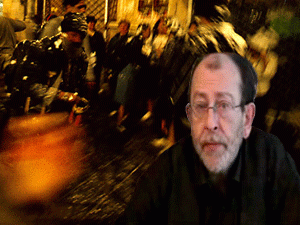| ┼┬đ└ă╚▀ | http://evrazia.org/article/753 | ||||
Against źModern times╗
In his lecture in Moscow Alain de Benoist focused mainly on the topic of globalization and expansion of liberalism The Centre for Conservative Research of Moscow State University (MSU) Faculty of Sociology gains stronger and stronger position among scholars and researchers. It cooperates with different universities and think-tanks, both Russian and international. As it was planned, the scale of enterprises endeavored by the Centre step-by-step becomes global. Alain de Benoist paid special attention to the task of proper understanding the terms źglobalization╗ and źmodern times╗, and defining their identity and main characteristics. He underlined such a qualities of globalization as abolition of time and space.
On the November 24th, the Centre for Conservative Research organized at the MSU Faculty of Sociology a lecture of a well-known French philosopher, geopolitics theoretician, and founder of źNew Right╗ movement Alain de Benoist. Among listeners were MSU students as well as members of Movement of Eurasian Youth. As it was planned, a large MSU lecture-hall become so crowded, that some people had to stand or sit on the floor. Numerous students, Eurasian movement activists, the Faculty of Sociology tutors, and journalists gathered to listen the lecture and ask French thinker a number of different questions. The lecture, simultaneously translated to Russian, was dedicated to the inter-civilization problems of relations between states and nations. Alain de Benoist focused mainly on the topic of globalization and expansion of liberalism understood as an unified meta-ideology. He pointed out a paradox of contemporary liberalism, which is, according to de Benoist, more radical than communist ideology in the area of pursuing many aims that communists failed to achieve. In his vast lecture, Alain de Benoist paid special attention to the task of proper understanding the terms źglobalization╗ and źmodern times╗, and defining their identity and main characteristics. He underlined such a qualities of globalization as abolition of time and space. As an example he gave the destruction of the New York Twin Towers (World Trade Centre) in September, 2001. According to de Benoist, during those events all the world borders became obsolete. All of the world population was able to watch the terrorist act simultaneously, and that fact largely influenced the worldĺs history. Planes and fast trains, as well as other contemporary means of transport, played a revolutionary role, completely abolishing the influence that space factor renders on the humanity. According to de Benoist, źModern times╗ may be defined as synthesis of five different processes: Europe understood as an cultural and civilization community accepted a number of smaller countries, a kind of a źsanitary cordon╗ between tellurocratic Russia and źOld Europe╗.
- individualization, understood as the destruction of traditional social and communal structures that aims to concentrate subjectivity in an independent individual; - Acceptation of common values; - De-sacralization (often called źdisenchantment╗ - Entzauberung - in the works of conservative thinkers); - Dominance of reason as the main epistemological instrument; - Broadening the value hierarchies and systems. Apart from ascertaining the contemporary global situation, French thinker, being the consequent opponent of market-liberal course of globalization, proposed some means of fighting against its destructive influence. He highlighted network, rhizomatic character of the process of spreading of the globalization, paid attention on specific of network-like structure and compared it to the typical organizations and groups in modern times. Alain de Benoist pointed it out: źThere is no centre in the networks; information spreads the way that computer viruses do╗. In the area of geopolitics sensu stricto, the founder of the źNew Right╗ movement picked out only three centres of power: China, United States, and Russia. According to Alain de Benoist. źEurope ceased to interpret the world independently╗ ľ it does not actively analyze the political environment anymore. As a result of this process, Europe (understood as an cultural and civilization community) accepted a number of smaller countries, a kind of a źsanitary cordon╗ between tellurocratic Russia and źOld Europe╗. The second, more brief part of the de Benoisĺ lecture, consisted of answers to the studentsĺ questions, which were asked verbally as well as written on pieces of paper. Listeners revealed a high level of knowledge in geopolitical and international matters. They were highly interested in the disposition of power in Europe, prospects of conservative thought, the possibility of foundation of new strategic alliances of the political map of the world. Listeners applauded Alain de Benoist with a long-lasting, spontaneous ovation. Numerous students and scholars continued their discussions over French thinkerĺs lectures on the corridors of the Faculty of Sociology for a long time after Alain de Benoist, accompanied by Alexander Dugin, left the audience. Andrew Kovalenko
╠Ó˛ňŔÓŰ Ó˝´ň¸Ó˛ÓÝ ˝ ŔݢţýÓ÷ŔţÝÝţ-ÓÝÓŰŔ˛Ŕ¸ň˝ŕţŃţ ´ţ˛ÓŰÓ "┼ÔÓšŔ " http://evrazia.org
URL ýÓ˛ňŔÓŰÓ: http://evrazia.org/article/753 |
|||||
